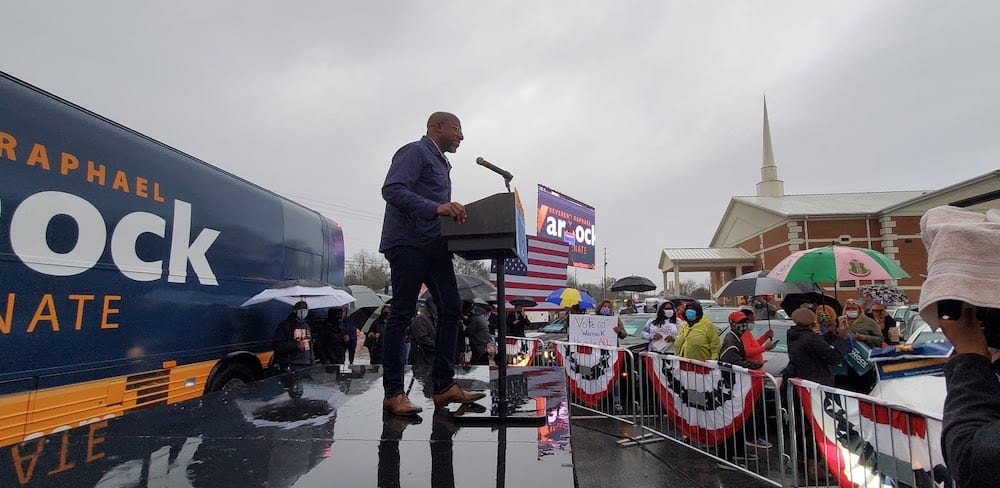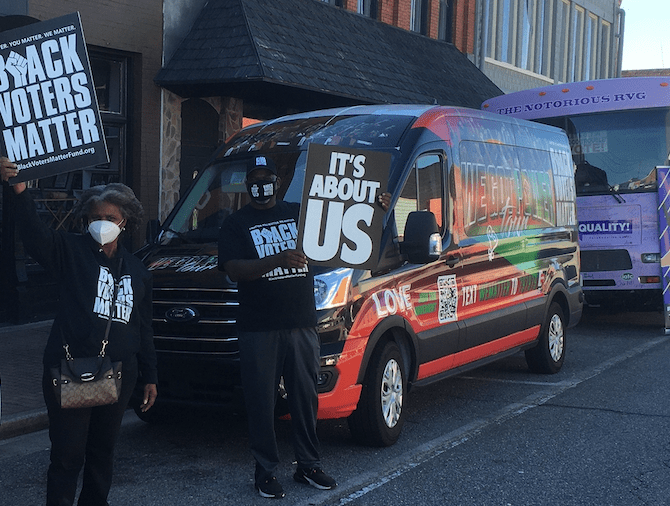Historic Georgia Runoffs, Powered by Grassroots, Return Democratic Control to Senate

(Photo: Sue Dorfman / Zuma Press)
Georgia has elected new Democratic senators as the historic finale of 2020’s general election that has recast Georgia’s political identity and will yield a Democratic Senate majority with a new mandate and pathway for governing in for President-elect Joe Biden.
Rev. Raphael Warnock was 73,000 votes ahead of Sen. Kelly Loeffler, the Republican incumbent, with more than 4.4 million ballots counted by Thursday. Georgia’s election of a Black minister to the U.S. Senate in a major historical achievement in the deep South.
“We were told we couldn’t win this election, but tonight we proved that, with hope, hard work and the people by our side, anything is possible,” Warnock told his supporters after midnight on Wednesday, when he was leading by 40,000 votes. “I am so honored by the faith that you have shown in me, and I promise you this: I am going to the Senate to work for Georgia, all of Georgia, no matter who you cast your vote for.”
Shortly before 2 AM Wednesday, the other Democrat in a runoff election, Jon Ossoff, pulled ahead of Sen. David Perdue, the Republican incumbent, as returns came in from populous metro Atlanta counties. While some rural counties had yet to finish reporting their counts, election officials said the majority of the remaining votes would favor Democrats. By early Thursday, Ossoff, an independent filmmaker, led by 35,000 votes.
“Yes, that’s correct,” Gabriel Sterling, a top state election official and a Republican, told CNN late on Election Night, discussing the remaining uncounted votes. “It’s really an irony because in the ‘60s and ‘70s, that [Atlanta region] was the hotbed of the Republican takeover in Georgia.”
Both Warnock and Ossoff’s margin of victory exceeded the state’s legal threshold for a recount.
Early on Wednesday, Perdue’s campaign issued a statement claiming that they won and said it would use “every available resource and exhaust every recourse to ensure all legally cast ballots are properly counted.” If no recount were triggered, Perdue would have few options.
While an additional 17,000 overseas and military ballots could arise as late as Friday and still count (as long as they had been postmarked by Election Day), those votes won’t change the first unofficial results. Georgia counties must certify their winners by January 15. The state certification deadline is January 22. Perdue’s challenge, if it comes, follows certification.
A Historic Finale to 2020
The impact of the Democratic victories on the nation’s political life and federal governance in the first years of the Biden administration cannot be underestimated. On virtually every major issue that Democrats care about, Biden would have been met with resistance had the Senate remained a Republican-led body. Once Georgia’s senators are seated, the body will have a 50-50 split between parties, but Vice President-elect Kamala Harris would be a tie breaker, giving Democrats control over the Senate agenda, committee assignments and administration’s appointees, including federal judges, cabinet posts and agency heads.
Those ramifications will play out after the Trump administration leaves office on January 20. On Wednesday, President Trump sought to block Congress’s certification of the 2020’s Electoral College votes by urging thousands of his supporters to march on the Capitol. After breaking through police barriers, forcing Congress to stop the certification process and marauding in congressional chambers, Biden was certified as the winner early on Thursday morning.
Trump and his allies falsely claim that the election was stolen. Before Wednesday’s rampage, they filed 63 lawsuits in state and federal courts to challenge the results in swing states where Trump lost. Trump lost all but one of those lawsuits, often due to lack of vote fraud evidence. Trump repeated many of those false claims at his rally on Wednesday, riling up his supporters to rush the Capitol. Hours later, dozens of Republicans stood to condemn the mob violence, but then repeated those same false claims to oppose the Pennsylvania’s Electoral College slate.
On Tuesday night, as Georgia’s Senate runoff results came in, Trump and high-profile supporters—a White House spokeswoman and Fox News host—tweeted that the runoffs were fraud-ridden. Their claim was baseless because while there were some election administration problems on Tuesday, no credible source reported any vote-forging chicanery.
Every top statewide official in Georgia, including the governor, secretary of state and election director, are Republicans. If anything, the state has been very aggressive in investigating voter fraud in 2020. It has found human errors made election officials, but no partisan wrongdoing.
Trump’s antics should not detract from the historic achievement in Georgia. The state emerged as a national political battleground in November after Biden’s surprise victory. The apparent victory of two Democrats in a runoff that set voter turnout records affirmed that its political landscape was undergoing historic change. The heart of that transformation was the result of years of effort by grassroots organizing led by the Black community leaders. More recently, those efforts expanded into other communities of color and the state’s newest residents.
Some pundits outside Georgia will credit Trump’s attacks on the state’s election system and top elected officials—for not finessing the count to ensure that he won—as the top reason why insufficient numbers of Republicans did not vote in the runoffs. But that analysis is not the full story. The runoffs had near-presidential election turnout levels, which showed that Georgians in both parties were engaged. What the Trump-centric analysis omits are the unprecedented efforts by communities of color to unite to turn out voters in November and in the runoffs.
Old-line groups, such as the Georgia county-level NAACP chapters, found themselves working with tech-savvy organizers who had tens of thousands of volunteers from across the country. Frontline groups were supported up with post card, phone bank and texting campaigns. In the state’s urban and rural communities, Black sororities, fraternities and community organizations partnered with new groups led by younger activists and organizers. While the Senate runoffs set records for spending on political advertising, the grassroots efforts turned out voters across the state. In short, for the first time in many years, Georgians could see their votes mattered.
Once the national media spotlight turns away from Trump’s attempted coup, there will be analyses and reports affirming these trends that have made Georgia the nation’s newest and most intriguing battleground state. On CNN early Wednesday morning, campaign data analysts noted that Biden’s 12,000-vote victory over Trump was a floor, or a baseline, for Democrats to prevail in a statewide race. Warnock’s margin was more than six times that size.
Smart analysts like CNN’s Harry Enten noted that Warnock didn’t just win in Atlanta’s suburbs—where many moderate Republicans voted for Biden. Warnock’s percentages in rural counties often was equal to, or exceeded Biden’s percentages, by several points, he said. Warnock’s campaign, like many grassroots groups, targeted and turned out overlooked voters of color. Those rural counties are still mostly run by elected white Republicans. But their political complexion is changing as non-white voters are discovering that they have power.
While the coming days may see partisan Republicans accuse Georgia’s election officials of running fraud-ridden Senate runoffs and even file litigation to challenge the results, there’s little indication that those efforts will succeed. A day after Sen. Loeffler lost in Georgia, she broke with Trump and said in the well of the Senate that she would no longer support challenging the state’s Electoral College slates. The day’s violence changed her mind.
In Warnock’s victory speech after midnight on Wednesday, he called on all participants in political life to start working together to help ordinary people solve life’s problems.
“In this moment in American history, Washington has a choice to make; we all have a choice to make,” he said. “Will we continue to divide, distract and dishonor one and other, or will we love our neighbors as we love ourselves? Will we play political games while real people suffer or will we win righteous fights together, standing shoulder to shoulder, for the good of Georgia, for the good of the country?”






